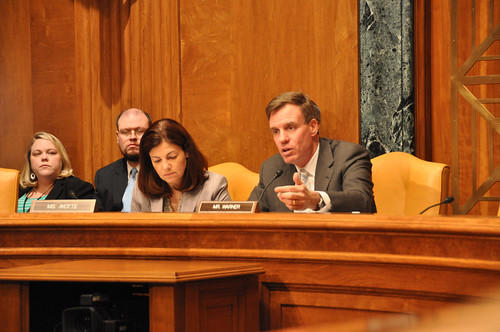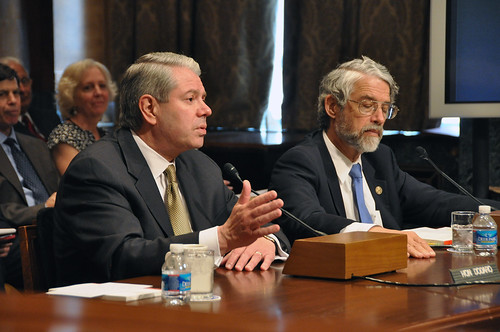In the News
Today, the Senate Budget Committee’s Task Force on Government Performance held its first hearing of the 113th Congress titled ‘Silo Busting: Effective Strategies for Government Reorganization.’ The Task Force has the charge of reviewing federal programs to make them more effective and efficient and to examine the information available to Congress to inform budget decisions. Today’s hearing brought together leaders actively working to reform the government to make it more effective and efficient.
“While there’s a wide range of items that Members of both parties disagree on,” said Senator Warner in his opening remarks, “this is actually a place where there’s a lot of bipartisan agreement. A more effective government is something we all want to strive for.”
The first two witnesses were Gene Dodaro, Comptroller General of the U.S. Government Accountability Office, and John P. Holdren, Director of the White House Office of Science and Technology. Both spoke about opportunities to reorganize the government to make it more effective and efficient.
Mr. Dodaro discussed how the Government Performance and Results Modernization Act of 2010 that was sponsored by Senator Warner was an important first step in moving towards a less wasteful, more effective government, but that Congress would need to continue holding up their end of the bargain to keep pushing for reforms.
“The 2010 [GPRA] modernization act requires Congress to be consulted more,”Dodaro mentioned, “and I think that Congressional oversight requiring that the agencies come up with good measures and keep those measures over time… is really important.”
“But unless Congress pays attention to the performance information,” he continued, “you can only expect incremental improvements… and that’s not going to be sufficient to deal with our long range fiscal challenges.
“I would agree with that,” said Senator Warner. “No matter what agency you are, you’ve got good programs, and you’ve also got programs that are not as good. We need to commit to using data to analyze and eliminate these programs that aren’t working. We don’t always like to acknowledge our less successful programs, but at the national level we’ve got to start doing it.”
Senator Warner also questionedDr. Holdren, who has overseen the efforts to consolidate the federal government’s duplicative science, technology, engineering, and math (STEM) programs from 226 to 110 – a more than 50% reduction. Senator Warner has been a strong advocate for increased government commitment to STEM fields, and here he emphasized that program consolidation did not imply any less of an investment in those programs’ goals.
“In literally every area of the government, we can list dozens of programs that are all after the same policy goal.”said Senator Warner. “One of the things I find so frustrating is that we don’t measure these programs’ effectiveness against each other.”
“What kind of resistance,” Senator Warner asked Dr. Holdren, “have you seen from agencies to these consolidation efforts?”
“On the whole,” replied Dr. Holdren, “the agencies appreciate and understand the reason for this approach. They understand the need for greater coordination, coherence, efficiency, and ease of evaluation.”
“In tight fiscal times,” Senator Warnersaid, “one of the ways we can get more bang for the buck is if we can look at smart, meaningful consolidation of these programs so that we can put more resources into the actual public policy goal rather than simply in the overhead and administrative costs of running programs.”

